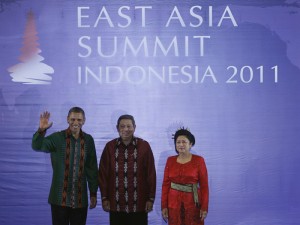-
posted by Anindya Dec 7th, 2011
 If there is anything good about crises, it is that they concentrate minds. As the world stands at the proverbial edge of the economic precipice, the looming crisis is focusing attention on fundamental problems that need to be resolved.
If there is anything good about crises, it is that they concentrate minds. As the world stands at the proverbial edge of the economic precipice, the looming crisis is focusing attention on fundamental problems that need to be resolved.Three platforms on which this focus could occur profitably are provided by the Group of 20 nations, the Asia-Pacific Economic Cooperation (APEC) forum, and the East Asia Summit (EAS) process.
The outcome of these meetings is relevant to Indonesia, which is a member of all three groupings. Indeed, Indonesia’s presence in the groupings – the first two economic and the third primarily strategic – gives it both the right and the responsibility to contribute to a re-stabilization of world order.
All eyes were on the G-20 meeting in the French city of Cannes early in November. Europe’s debt crisis, which can unmake the eurozone, shone the spotlight on the world leaders gathered there. With the fate of Greece and Italy hanging in the balance, it was natural that the G-20, which includes European economic powerhouses Germany and France, would be looked to for solutions.
It was good, however, that the meeting did not turn out to be Eurocentric. The presence of countries such as Indonesia helped ensure that. The meeting’s final communiqué did welcome the eurozone’s plans to restore confidence and financial stability, but it also looked at more international issues, such as the commitment to moving more rapidly towards greater exchange rate flexibility. This was a reference to China’s undervalued currency, which is accused of causing job losses in the United States.
Then, the G-20 leaders agreed to support the International Monetary Fund and give it more money if necessary. They called on countries with strong public finances to take steps to boost domestic demand, and set up a task force on youth employment.
If these plans succeed, they will help to boost growth and rebalance the global economy. The G-20 is important because it includes emerging economies such as Indonesia in addition to the mature G-8 countries.
For all the talk about the economic center of gravity moving toward Asia, the truth is that Asian economies like Indonesia need an economic world order whose three sub-orders – the North American, the European and the Asian – can act in concert.“Concert” was also the key word at the APEC gathering in Honolulu. US President Barack Obama suggested this metaphor when he referred to the forum’s ultimate goal, a “seamless regional economy”.
Concerts are nothing if not seamless: The orchestra must play together if it is to play at all. The hope of seamlessness is particularly important because the Asia-Pacific region, which accounts for more than half of the world’s economic output and contains buoyant economies such as those of China, India and Indonesia, can help to contain the effects of a new global crisis. Indeed, much of the rest of APEC offers markets that can help revive the sickly American economy.
The Bogor vision
Indonesia’s stake in a seamless regional economy cannot be clearer. APEC’s Bogor Goals – adopted in the eponymous city in 1994 – are a specific commitment to implementing free and open trade and investment across the region.
In a tribute to the Bogor vision, APEC today is focusing on three specific areas: increasing trade and investment, promoting green jobs and streamlining and coordinating regulations in order to encourage trade and job creation.
In this context, President Susilo Bambang Yudhoyono correctly reiterated the need for economic growth that is sustainable, balanced and inclusive. Speaking at the APEC CEO Summit, he made a point not always acknowledged by business leaders who are driven by quarterly performance results. This is that growth must create as many stakeholders as possible if it is to create wealth for shareholders in the long run.
The president spoke this way because he represents a country which, even with an emerging global economy, has millions to feed, house, educate and employ.
Indonesia is important because it bridges the divide between two kinds of worlds reflected at APEC meetings. The first is the developed world, which needs the markets of the developing world if its economic stagnation and demographic greying are not to cost it its pole position.
The second is the developing world, whose hunger for success and entrepreneurial dynamism could provide new sources of economic growth – but only if the overall architecture holds.
Two worlds or one?
Indonesians understand both worlds. Their businessmen, students and policy intellectuals live in a borderless universe where they are the equals, if not betters, of successful people anywhere. Other Indonesians, particularly those existing on the vast agricultural landscape that makes up most of the country, understand the pain and tribulation of those without proper educational and financial access to the gilded economy of globalization.
Combining these two perspectives, the difference that Indonesia can keep making at APEC gatherings is to remind everyone that even the strongest of chains are only as strong as their weakest links. Indonesia is not a weak link, but it must continue to speak up for the developing world, whose interests must be kept in mind even as countries race ahead. No one can race too far ahead in a concert.
With the East Asia Summit, this region is literally looking at the possibility of a concert of powers. That was a dream until now because the EAS excluded the US and Russia. The US is not geographically a part of East Asia, but the region’s security architecture is incomplete without the presence of the Pacific’s lynchpin power. Russia is a great Eurasian power in its own right.
With their membership, the EAS has been reborn. Indonesia, as the EAS host in Bali, will no doubt seize the momentum created by a reborn EAS. The South China Sea dispute is important because it can destroy China’s relations with Southeast Asia. However, what is even more important is the need to give China a stake in the eventual shape of the East Asian order.
Indonesia, with its own lynchpin role in ASEAN, should play a crucial role in keeping ASEAN in the conductor’s role in the EAS. Indonesia is a friend of the United States without being an enemy of anyone else, including China. It has everything to gain from the peaceful and stable evolution of the East Asian order.This, then, was the month of three concerts. If the orchestras continue performing, their symphonies will be music to the ears at a time when there is no dearth of a cacophony of bad news.
Anindya Novyan Bakrie is vice chairman of the Indonesian Chamber of Commerce and Industry, CEO of Bakrie Telecom and chairman of VIVA Media Group. He is a presidentially-appointed member of the APEC Business Advisory Council and sits on the board of the International Council of Harvard University’s Belfer Center of Science and International Affairs.
http://www.thejakartaglobe.com/columnists/good-tidings-in-bad-times/482479
Leave a Reply
INSTAGRAM
TWITTER
FACEBOOK
-









